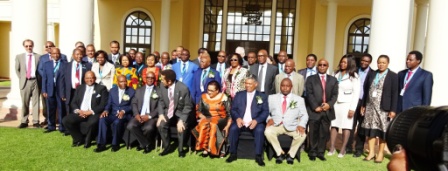Poverty free and food secure SADC: Workshop takes stock of failures and redress needed
17/05/2016
Poverty free and food secure SADC: Workshop takes stock of failures and redress needed
*ESAFF beats drum for regional agreements domestication agenda
By ESAFF Correspondent
Southern African Development Community Secretariat has expressed gratitude to farmer organisations in the SADC region for participating at a Ministerial Workshop on food security and poverty eradication, that took place in Gaborone, Botswana.
ESAFF and SACAU are the regional farmer organisation that were invited to contribute to the high-level ministerial meeting held in May 2006 in Botswana.

In his letter to ESAFF, the SADC Deputy Executive Secretary for Regional Integration (DES-RI), Dr Thembinkosi Mhlongo wrote:
“ESAFF intervention enriched the dialogue that followed and the overall outcome of the workshop.”
The special workshop was convened by Hon. Lt General Dr. Seretse Khama Ian Khama, President of the Republic of Botswana and the Chairperson of Southern Development Community (SADC).
The mid year event was attended by Ministers and Senior Officials representing SADC Member States, private organisations, farmer organisations, United Nation’s Agencies and other International Cooperating Partners.
President Khama quoted SADC Regional Vulnerability Assessment and Analysis Synthesis Reports, that 40% of all SADC citizens were currently living in abject poverty. “Poverty eradication has become the overarching objective for the SADC Regional integration agenda,” he told the workshop.
ESAFF presented a strong case on the need to domesticate and implement regional and continental agreements.
“As small holder farmers we are happy such an important workshop has recommended domestication by states of regional and international agreements that will help to uplift the lives of farmers,” noted Mr. Joe Mzinga, ESAFF Coordinator.
Speaking at the same workshop, The SADC Executive Secretary, Dr. Stergomena Lawrence Tax said about 25.2 million people in SADC region are vulnerable to food insecurity annually in the past 5 years. She said that 12 of the SADC members (out of 15) have a stunted growth of above 20%. The level of stunted according to World Health Organisation (WHO) shows countries face serious chronic malnutrition that jeopardize future generation of SADC. The region is a home of 292 Million people of whom 61 live in rural area and depends on agriculture.
The Workshop identified critical issues and interventions measures to be submitted by the SADC chairman to the heads of States Summit later this year. According to the workshop report low pace of domestication and implementation of regional integration instruments (Protocols, policies and strategies) at Member State level is among critical issues that need to be addressed. The Workshop recommended that the SADC Chairperson champion a binding monitoring and evaluation mechanism for continental and regional commitments to facilitate the implementation of regional instruments. To this effect, the SADC Secretariat should be empowered and capacitated to monitor and report to Summit.
On insufficient progress in the implementation of the Regional Poverty Observatory and Regional Poverty Reduction Framework; the Workshop recommended the strengthening of the Regional Poverty Observatory and ensuring continuous monitoring and assessment of the poverty situation and report annually to Summit.
Other issue of insufficient and unsustainable financing and investment in agriculture by the public and private sectors that constrained growth in agricultural GDP resulting in food insecurity and poverty, the workshop underscored the need for substantive resources (financial and human) to be mobilized in order to effectively address poverty and food insecurity. The importance of collaborative efforts among public sector, private sector and social sector was also emphasized in order to leverage additional investment and financial resources. Considering the importance of agriculture in addressing poverty, the workshop appealed to Member States to build a case for increased budgetary allocations and investment for agriculture with clear returns on investment.
Others are: Inadequate pro-poor development strategies targeting the vulnerable groups; unsustainable use and under-utilisation of natural resources; and insufficient promotion of smallholder agriculture as a business enterprise.
It was also recommend that to increase agricultural production, productivity and competitiveness – particularly in crops, livestock, and fisheries, increased access to agricultural inputs, markets and finance was essential.
The workshop also recommended strengthening of the design and implementation of social protection programmes targeted at the poor and vulnerable population in areas such as quality education, skills development, employment, health, safety nets and risk management.
“Social programmes that have potential to transform agriculture to business levels should be identified and promoted. However, in implementing these, there is need to minimize dependency syndrome and market distortions,” noted the workshop report.
Another recommended was the promotion of sustainable utilization of natural resources as a viable land use option for poverty reduction and food security.
The workshop at the same time recommended promotion of farming as a business enterprise. “Aggregation of farmers should be promoted to realise the economies of scale in production and marketing.”
The workshop also sought the strengthening of regional and national information systems including early warning and monitoring systems, and acceleration of the establishment of the regional disaster preparedness fund.






















